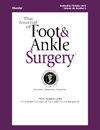高尿酸血症可能增加跟腱断裂的风险:病例对照研究
IF 1.3
4区 医学
Q2 Medicine
引用次数: 0
摘要
大量研究表明,高尿酸可导致晶体在下肢肌腱中沉积,进而损害跟腱。本研究旨在解释高尿酸血症是否与跟腱断裂有关。病例组包括 2013 年至 2022 年期间在同一机构确诊为跟腱断裂的患者。同期接受体检的健康受试者为对照组。采用倾向评分匹配法,以 1:1 的比例进行匹配。比较了两组患者的人口统计学和临床特征。研究共纳入了 514 名患者(ATR=257;对照组=257)。两组患者患有高尿酸血症的比例差异显著(跟腱断裂组=43.6%;对照组=27.6%;P本文章由计算机程序翻译,如有差异,请以英文原文为准。
Hyperuricemia May Increase Risk of Achilles Tendon Rupture: A Case Control Study
It has been demonstrated in a number of studies that high levels of uric acid can cause crystal deposition in the tendons of the lower extremities, which in turn can impair the Achilles tendon. This study aimed to interpret whether hyperuricemia is relevant with Achilles tendon rupture. Patients diagnosed with Achilles tendon rupture at the same institution between 2013 and 2022 were included in the case group. Healthy subjects who had physical examinations during the same period were included in the control group. Propensity score matching was used to match in a 1:1 ratio. Demographic and clinical characteristics of patients in both groups were compared. Five hundred and fourteen patients were included in the study (ATR=257; Control group=257). The proportion of individuals with hyperuricemia varied significantly between the 2 groups (Achilles tendon rupture group=43.6%; control group=27.6%; p<0.001). The Achilles tendon rupture and hyperuricemia were linked by conditional logistic regression (p<0.001; OR=2.036; 95CI%=1.400-2.961). Compared with healthy subjects, patients with hyperuricemia have a higher risk of Achilles tendon rupture. Further studies are required to verify the effects of hyperuricemia and monosodium urate crystals on Achilles tendon structure.
求助全文
通过发布文献求助,成功后即可免费获取论文全文。
去求助
来源期刊

Journal of Foot & Ankle Surgery
ORTHOPEDICS-SURGERY
CiteScore
2.30
自引率
7.70%
发文量
234
审稿时长
29.8 weeks
期刊介绍:
The Journal of Foot & Ankle Surgery is the leading source for original, clinically-focused articles on the surgical and medical management of the foot and ankle. Each bi-monthly, peer-reviewed issue addresses relevant topics to the profession, such as: adult reconstruction of the forefoot; adult reconstruction of the hindfoot and ankle; diabetes; medicine/rheumatology; pediatrics; research; sports medicine; trauma; and tumors.
 求助内容:
求助内容: 应助结果提醒方式:
应助结果提醒方式:


